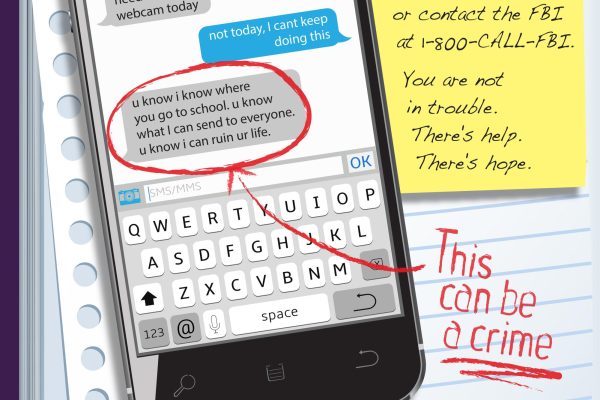Editors Note: This article contains language and discusses topics relating to suicide, depression, pornography and sexual coercion that may not be suitable for all ages and readers. If you or anyone you know needs mental health support, reach out to or call 988 for the National Suicide Prevention Hotline. *The name Stella James is fabricated to protect the privacy of an anonymous student source.
Sextortion can begin with only one explicit photo being sent to an offender. It can end in thousands of dollars lost to predators and can cause victims to experience mental health crises.
In 2023, at least 20 minor victims of sextortion committed suicide in the United States. The FBI describes sextortion as “a crime in which an offender coerces a minor to create and send sexually explicit images or video,” and its effects have cost children’s lives and at least 13.6 million dollars. In 2023 alone, the National Center for Missing and Exploited Children saw “186,819 tips of online enticement, a category which includes sextortion.” Online enticements are used to lure minors in, virtually, by communicating with children via the internet. Sextortion is a subcategory which falls within the broad category of online enticement.
Sextortion can occur in two different ways: financial sextortion and extortion for an offender’s own personal gratification. Financial sextortion occurs when a minor sends explicit media of themselves to an adult and is coerced into paying them so the offender does not release the images. According to the FBI, young boys are often the targets in these schemes, where the predator poses as a young girl and manipulates the usually teenaged victim to perform explicit acts, which the offender secretly records.
Cases of financial sextortion are most common. However, in other cases, the offender has the minor send them the explicit media or webcam videos for their own personal gratification.
Sergeant Sean Pierce from the San José police department said a common misconception about victims of sextortion is that they are “troubled kids” with pre-existing vulnerabilities.
Young girls have historically been targets of sextortion for the offenders’ own interest, as opposed to financial sextortion. However, in recent years, the trend has shifted towards boys with law enforcement speculating it is because boys are easier to coerce said Pierce.
“It always starts out very, very innocent. But the problem is they start talking to him inappropriately, and boys fall for it,” Pierce said. “All it takes is one photo.”
After that initial photo is sent, the predator gives the victim instructions, telling them to send a certain amount of money to a bank account, usually in the thousands, to gauge how much money the victim can pay. If the victim does not wire the account the money, the offender threatens to send their explicit images to friends, family and any followers of the victim.
“If I’m a very popular kid, and I’ve had my account for a long time, and I have 1200 followers. I’m going to be more susceptible to do what [the predator] wants because I have a lot more to lose because I have all these followers who it’s going to go out to,” Pierce said.

Fitness and wellness teacher Natalie Coleman has integrated education on sextortion and online dating into her ninth grade human development class’ sexual education curriculum. The unit is to accommodate the newfound prevalence of online sexual coercion among impressionable young people.
“I think it’s important that we talk about these kinds of topics now, just so [students] are aware. You guys are the technology generation. It’s easy to convince someone to believe in something, in hopes that they do what you want them to do,” Chambers said. “[It is important] to show [students] signs and symptoms [and] red flags”
Apps that have encryption, such as Snapchat and Instagram , allow images and messages to be deleted or changed and are called “red flag” apps. Pierce said these apps raise questions for parents and law enforcement.
“These companies find stuff on their platforms, and they send them into the NCMEC. They send them out to the different Internet Crimes Against Children (ICAC) task forces.” Pierce said. “So we show parents, ‘Hey, these are the apps that are most dangerous. These are the ones that we’re seeing the most cyber tips from.’”

Archer student Stella James* shared her experience with being sexually pressured online over the Snapchat, which is where, alongside online websites such as Omegle (now shut down) and Instagram, the majority of contact with predators begins. When sending messages with a boy she was in a relationship with, he asked her for nude images of herself. When she declined, she was continuously pressured by him.
“He was like, ‘no.’ He kept going back and forth, and I kept saying, ‘no, no, no, I’m not gonna do it,'” James said. “I think he was thinking I was joking, and I eventually would just send my nudes, and I don’t think that is at all what was going to happen.”
Deciding what to do if this is happening to you or someone you know can be a daunting choice to make. Sergeant Pierce tells young people to go to trusted adults and law enforcement officers if they find themselves in a situation where they are being sexually pressured, because they will be protected by the law.
According to the FBI, minors who speak out about being victims of sextortion will be protected, as they are not ones breaking the law. Offenders take advantage of the fact that many victims may feel embarrassed or ashamed. However, even minors who may not be old enough to be on a certain app or who sent money to offenders will not get in trouble with law enforcement.
Pierce shared that victims can start by saving any online conversations and social media profiles that sextorted them, as they can be helpful in prosecuting the offender and ensuring they will not be able to harm any other children. Once doing this, the minors should contact their local Internet Crimes Against Children (ICAC) task force and provide them with their experience and any evidence they have from their online encounters.
Pierce’s police department has launched the Vigilante Parents Initiative, which works to help parents understand online safety, technology and how to protect their kids online. With the rise of AI, offenders have taken non-explicit photos of victims and turned them explicit through the use of GenAI, which creates unique images from photos submitted to the platform.
“Look what’s happening with AI right now with photos and videos,” Coleman said. “It’s easy to convince someone to believe in something, in hopes that they do what that you want them to do.”















Gabby Kaplan • May 15, 2024 at 2:32 pm
Such an important and shocking topic! Great job writing this Maya!
Olivia Hallinan-Gan • May 15, 2024 at 1:54 pm
Such a good story, Maya. Very interesting!
Charlotte Burnap • May 15, 2024 at 9:39 am
This is such an interesting and engaging article, Maya! You’re such a talented writer, and it really shows in this piece. This is such a complex and challenging issue and I’m so glad that you’re bring awareness to it.
Angelica Hernandez • May 14, 2024 at 8:03 pm
Maya,
This is an amazing article. The fact that you did your due diligence and spoke to an actual police officer who deals with these cases, is truly impressive. Keep up the great work, these topics are hard to digest for many, but so critical for parents. Adelante!